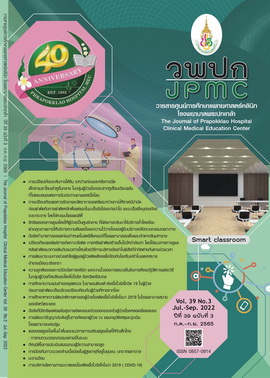Comparison of the Outcome and Survival between Neoadjuvant Chemotherapy and Primary Surgery in Advanced Stage Ovarian Cancer, Fallopian Tube Cancer and Peritoneal Cancer: Propensity Score Methods
Main Article Content
Abstract
BACKGROUND: Ovarian cancer is the second most common gynecological malignancy, but is the most common cause of death in this form of malignancy. This was because almost all cases were in an advanced stage on the first visit and had delayed hospitalization due to the late symptoms.
OBJECTIVES: The aim was to compare the treatment outcome and survival between neoadjuvant chemotherapy (NACT) and primary surgery in advanced stage ovarian cancer, fallopian tube cancer, and peritoneal cancer.
METHODS: This study was therapeutic research with a retrospective cohort design of Stages III-IV ovarian cancer, fallopian tube cancer, and peritoneal cancer. The participants underwent treatment at the Oncologic Gynecology Unit, Surin Hospital, Thailand from January 1, 2011 to April 30, 2021 with a follow-up to November 30, 2021. The patients were classified into two groups: the NACT group and primary surgery group. The data of the baseline characteristics, stage, ECOG, CA125 level on the first diagnosis, cell type cancer, tumor grade, ascites, and chemotherapy regimen were collected. The data were analysed with multivariable binary risk regression, propensity score analysis, and covariate modeling.
RESULTS: A total of 220 patients consisted of 87 patients in the NACT group and 133 patients in the primary surgery group. The NACT group had a mean age of 56.8 years, which was greater than that of the primary surgery group (52.7 years.). The mean propensity score of the NACT group was 0.6±0.3, and the primary surgery group was 0.3±0.2. The NACT group had complete remission that was less than the primary surgery group (37.9% vs 68.4%), but also had partial or stable remissions and more deaths than the primary surgery group. There were no significant differences after adjusting the propensity score, and the NACT group tended to display more complete remission.
CONCLUSIONS: Treatment of advanced ovarian cancer, fallopian tube cancer, and peritoneal cancer was provided to both the NACT or primary surgery groups because after adjusting the propensity score, there were no significant differences in the complete, partial, or stable remissions and deaths.
Thaiclinicaltrials.org number, TCTR20220225007
Article Details

This work is licensed under a Creative Commons Attribution-NonCommercial-NoDerivatives 4.0 International License.
References
Ferlay J, Soerjomataram I, Dikshit R, Eser S, Mathers C, Rebelo M, et al. Cancer incidence and mortality worldwide: sources, methods and major patterns in GLOBOCAN 2012. Int J Cancer [Internet]. 2015[cited 2021 Jan 2];136(5):E359-86. Available from: https://onlinelibrary.wiley.com/doi/10.1002/ijc.29210
Jittithaworn S.. Ovarian cancer [internet].2020 [cited 2021 Sep 15]. Available from: https://www.rama.mahidol.ac.th/cancer_center/th/knowledge/gyne/ovary
Griffiths CT. Surgical resection of tumor bulk in the primary treatment ofovarian carcinoma.Natl Cancer InstMonogr 1975;42:101-4.
Bristow RE, Tomacruz RS, Armstrong DK, Trimble EL, Montz FJ. Survival effect of maximal cytoreductive surgery for advanced ovarian carcinoma during the platinum era: a meta-analysis. J Clin Oncol 2002;20:1248-59.
Kehoe S, Hook J, Nankivell M, Jayson GC, Kitchener H, Lopes T, et al. Primary chemotherapy versus primary surgeryfor newly diagnosed advanced ovarian cancer (CHORUS): an open-label, randomised,controlled, non-inferiority trial. Lancet 2015;386(9990):249-57.
Vergote I, Tropé CG, Amant F, Kristensen GB, Ehlen T, Johnson N, et al. Neoadjuvant chemotherapy or primary surgery in stage IIIC or IV ovarian cancer. New England Journal of Medicine 2010;363:943-53.
Fagotti A, Vizzielli G, Fanfani F, Chiantera V, Margariti PA, Gallotta V, et al. Phase III SCORPION trial (ID number: NCT01461850) in epithelial ovarian cancer patients with high tumor load receiving PDS versus NACT: An interim analysis on peri-operative outcome. Gynecologic Oncology 2015;138(S1):1-4.
Onda T, Satoh T, Saito T, Kasamatsu T, Nakanishi T, Nakamura K, et al. Comparison of treatment invasiveness between upfrontdebulking surgery versus interval debulking surgery following neoadjuvantchemotherapy for stage III/IV ovarian, tubal, and peritoneal cancers in a phaseIIIrandomised trial: Japan Clinical Oncology Group Study JCOG0602. EurJCancer. 2016;64:22-31.
Reuss A, du Bois A, Harter P, Fotopoulou C, Sehouli J, Aletti G, et al. TRUST: Trial of radical upfront surgical therapy in advanced ovariancancer (ENGOT ov33/AGO-OVAR OP7). Int J Gynecol Cancer2019;29:1327-31.
Vergote I, Coens C, Nankivell M, Kristensen GB, Parmar MKB, Ehlen T, et al. Neoadjuvant chemotherapy versus debulking surgery in advancedtubo-ovarian cancers: pooled analysis of individual patient data from the EORTC55971 and CHORUS trials. Lancet Oncol 2018;19:1680-7.
Coleridge SL, Bryant A, Lyons TJ, Goodall RJ, Kehoe S, Morrison J. Chemotherapy versus surgery for initial treatment in advanced ovarian epithelial cancer. Cochrane Database Syst Rev [ internet] 2019 [cited 2021 Sep 11]. Available from: https://www.ncbi.nlm.nih.gov/pmc/articles/PMC6822157/pdf/CD005343.pdf
Thrall MM, Gray HJ, Symons RG, Weiss NS, Flum DR, Goff BA. Neoadjuvant chemotherapy in the Medicare cohort with advanced ovarian cancer. GynecolOncol 2011;123:461-6.
Wright AA, Bohlke K, Armstrong DK, Bookman MA, Cliby WA, Coleman RL, et al. Neoadjuvant chemotherapy for newly diagnosed,advanced ovarian cancer: Society of Gynecologic Oncology and American Society ofClinical Oncology Clinical Practice Guideline. GynecolOncol 2016;143:3-15.
vanMeurs HS, Tajik P, Hof MHP, Vergote I, Kenter GG, Mol BW, et al. Which patients benefit most from primary surgery or neoadjuvantchemotherapy in stage IIIC or IV ovarian cancer? An exploratory analysis of theEuropeanOrganisation for Research and Treatment of Cancer 55971 randomisedtrial. Eur J Cancer 2013;49:3191-201.
Russell B, Hawarden A, Gee M, Edmondson RJ. Propensity score matchingconfirms that primary surgery or neoadjuvant chemotherapy result in equivalentsurvival within a comprehensive cohort of patients with high-grade serousovarian cancer. GynecolOncol2021;160(1):24-31.

